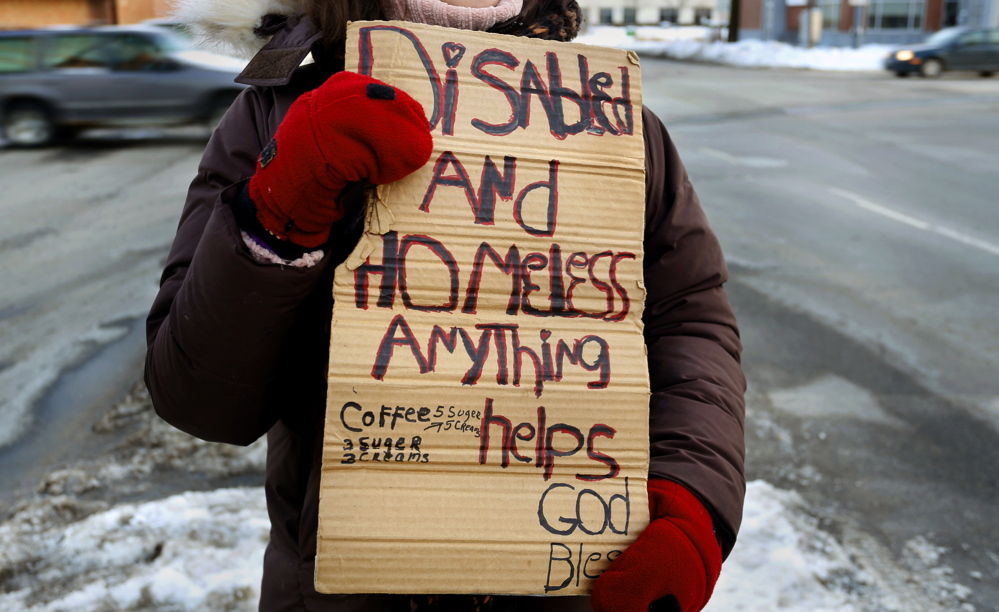Civil rights advocates and attorneys for the city of Portland will meet Friday in federal appeals court in Boston to argue over a city ordinance that would ban panhandlers from standing on street medians.
The city is looking to reverse a U.S. District Court ruling issued Feb. 12, 2014, that struck down its ordinance prohibiting people from standing on medians that separate vehicle traffic at busy intersections. A federal district judge ruled the ordinance is unconstitutional because it infringes upon free speech – whether it’s a social protest or a solicitation for cash.
The 1st U.S. Circuit Court of Appeals in Boston will hear arguments Friday.
“From the beginning, this has been a case about the rights of protesters and demonstrators to speak out on matters important to the public,” said Zachary Heiden, legal director of the American Civil Liberties Union of Maine, which is co-counsel for three residents who challenged the ordinance.
The city is eager to argue against the District Court’s interpretation of the ordinance, said its spokeswoman, Jessica Grondin.
“We look forward to the opportunity to present the city’s case,” Grondin said. “We believe that the ordinance, which is aimed at public safety, is consistent with the law and does not impermissibly infringe free speech.”
The Portland City Council passed an ordinance in July 2013 prohibiting people from standing on street medians, including people who are asking passers-by for money.
At the time, city officials primarily expressed safety concerns about panhandlers walking or stumbling into traffic. Critics called the ordinance an attempt to move panhandlers to less visible locations.
The ordinance, which took effect that August, was challenged in federal court by the ACLU of Maine and the Boston-based Goodwin Procter law firm, which represented three residents: Wells Staley-Mays and Michael Cutting, two political activists; and Alison Prior, who has stood on medians holding a sign asking for money. The plaintiffs argued that the ban was an unconstitutional restriction of free speech.
The city agreed not to enforce the ordinance until the court issued a final ruling. In the meantime, panhandling on street medians has remained a common practice in Portland.
Both sides presented their arguments during a one-day trial in U.S. District Court in November 2013, and Judge George Singal ruled last February that the ordinance was unconstitutional.
He cited in his ruling the fact that Portland’s ban was not intended to apply to people who stand on medians to post campaign signs.
Legal briefs filed in the 1st U.S. Circuit Court of Appeals by both parties in November offer a preview of their arguments.
The city contends that its ordinance, as written, does not target one type of speech over another, and is intended to protect public safety.
The plaintiffs argue that interpretation of the ordinance by city officials during the trial indicated that they would discriminate against nonpolitical speech while allowing people to post campaign signs.
City attorney Jennifer Thompson argued that the ordinance regulates conduct, “namely lingering in the middle of city streets, between lines of moving traffic, by standing, sitting or staying on city median strips,” rather than the content of speech.
It would not apply to political campaign signs only because it takes little time to install them, and any other individual or business could install a sign on a median as long as they had proper permits, she said.
Attorneys for the plaintiffs, however, argued that the city revised its interpretation after the District Court ruling was issued – a claim Thompson called disingenuous.
The plaintiffs also wrote that the city failed to meet its burden of proof in court, and that the District Court did not make any clear errors interpreting the facts of the case or the ordinance itself.
The city indicated in April 2014 that it would appeal the District Court ruling, but didn’t formally do so until the appeals court ruled on a similar case brought against the city of Worcester, Massachusetts.
On June 19, the appeals court ruled in favor of the city of Worcester. The city of Portland believes that ruling will bolster its case.
Heiden, of the ACLU of Maine, said the Worcester case differs from Portland’s.
That case focused only on a request to temporarily prevent Worcester from enforcing a ban until the merits of the case were fully litigated. In Portland, a full trial on the merits took place.
A U.S. Supreme Court decision on a different free-speech conflict playing out in Portland also could play into Friday’s arguments.
The Supreme Court issued a ruling last June striking down a no-protest buffer zone around abortion clinics in Massachusetts. A similar buffer zone was created in Portland – with the support of the ACLU of Maine – but subsequently nullified by the ruling.
Ironically, the Supreme Court decision allowing protests outside the doors of abortion clinics could bolster ACLU of Maine’s panhandling case, Heiden said.
“I think that decision made it harder for municipalities to restrict free speech activities on streets, sidewalks, and I would think medians as well,” he said.
Randy Billings can be contacted at 791-6346 or at:
rbillings@pressherald.com
Twitter: @randybillings
Send questions/comments to the editors.




